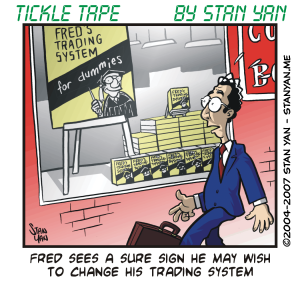Jack just abandoned his trading plan and ended up making a losing trade. He thinks, “Why did I do it again? Why can’t I stick with my plan?” He feels guilty. He’s kicking himself for making a mistake. Guilt is a common emotion in trading. We may feel guilty for a variety of reasons. Guilt protects us from repeatedly making dumb mistakes, but is it always productive? Just like many unpleasant emotions, guilt can interfere with carefree, effortless trading.
Guilt is a protective emotion. Throughout childhood, our parents taught us right from wrong, and these rules were learned and stored in what Freud called the “superego.” When we break a rule, we naturally feel anxiety and guilt. Guilt keeps us in line. It prevents us from breaking a moral rule that we hold dear. Some traders report feeling guilty whenever they make a trade. They may have been brought up in a family where trading is viewed as a form of gambling and may have been taught that gambling was immoral. If you were brought up with these values, then you may be especially prone to feeling guilty. Most traders, however, feel guilty when they abandon their trading plan. They break their trading rules, and understandably, feel guilty.
When you abandon your trading plan, is it useful to feel guilty? Most of the time it is not. Sure, guilt prevents us from risking a huge stake on a half-baked plan. It isn’t a good idea to risk too much on any given trade. If you trade with money you can’t afford to lose, you will understandably feel guilty. In that case, guilty feelings are protecting you from potential financial destruction. But when you make a trading error, it may not be useful to feel guilty. You may want to try to alleviate feelings of guilt in these circumstances. Unless you get your emotions under control, you won’t trade calmly and rationally.
Guilt isn’t always productive while trading. When you feel guilty, you ruminate about how bad things are. You also tend to think you are a “bad” person and deserving of punishment. There’s no time to ruminate while actively trading, however. It gets you nowhere. If you want to stay ahead of the crowd, you must continually try to solve problems rather than ruminate about what you did wrong and feel down about it. You must find creative solutions to tough problems, but guilt distracts you from freely searching for innovative, fresh solutions. So when you feel guilty, think positively, “So I made a mistake. That doesn’t mean I’m worthless or prone to make the mistake over and over again. Mistakes are a part of life. I’ll try to follow my plan next time, and develop the confidence I need to stay disciplined.” Why beat yourself up? Take setbacks in stride and move on.
Guilt can protect us at times, but while trading, we often feel guilty about losses that are just commonplace in the trading business. If you are experiencing unproductive guilt, learn to control it. The more you can trade calmly and freely, the more profitably you will trade in the long run.


